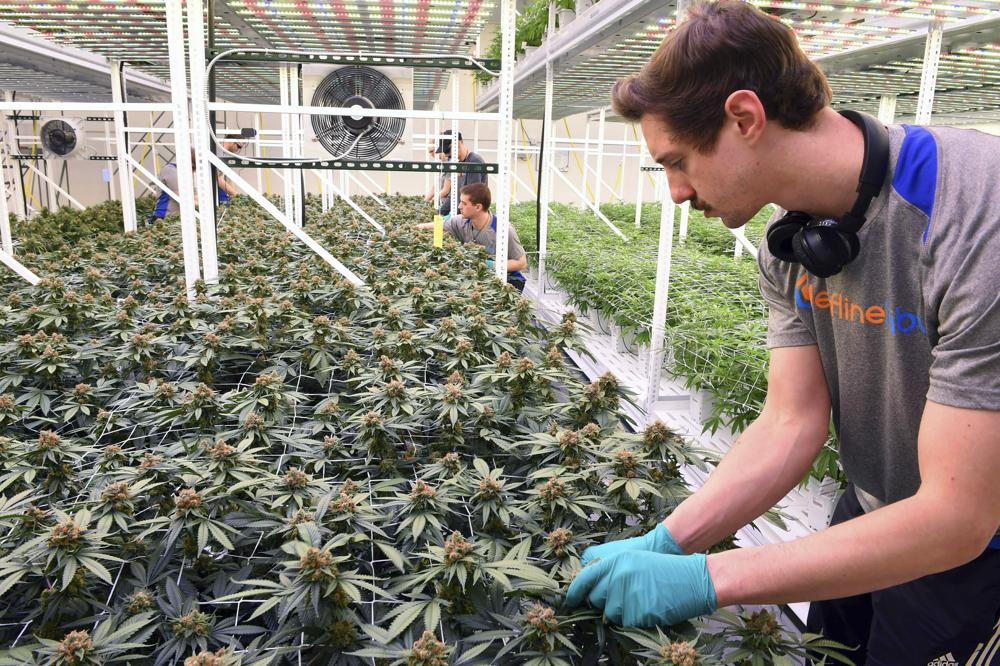Minnesota bill to legalize marijuana gets major rewrite

FILE - Cultivator Hunter Rogness prunes fan leaves from marijuana plants in the Leafline Labs grow center in Cottage Grove, Minn., Feb. 21, 2019. Legislation to legalize recreational marijuana for adults in Minnesota got a major rewrite Tuesday, March 14, 2023, with the addition of new language to regulate and protect the state’s burgeoning industry in low-potency edibles and drinkables. (Scott Takushi/Pioneer Press via AP, File)
ST. PAUL, Minn. (AP) — Legislation to legalize recreational marijuana for adults in Minnesota underwent a major rewrite Tuesday with the addition of new language to regulate and protect the state’s burgeoning industry in low-potency edibles and drinkables.
Low-potency products containing THC derived from industrial hemp instead of full-strength cannabis have been legal in Minnesota since last year. But the law that legalized them, which quietly slipped through with many lawmakers apparently unaware of what it did, lacks much of a framework for regulating products such as gummies and seltzers with dosages capped at 5 milligrams of THC.
The hemp provisions were added to the version traveling through the Senate when it stopped in the State and Local Government Committee on Tuesday. A similar amendment will be added to the House version of the bill next week when it returns to the Commerce Committee, said the lead House author and committee chairman, Democratic Rep. Zack Stephenson, of Coon Rapids..
“The prohibition of cannabis is a failed system that has not achieved the desired goals,” the other lead author, Democratic Sen. Lindsey Port, of Burnsville, told the state and local government panel. “It has had incredible costs for our communities, especially for communities of color.”
The 142-page amendment adopted Tuesday deals extensively with regulatory and licensing provisions to address stakeholder feedback, Port said, including “significant adjustments” to give local governments more control, though they would remain barred from total bans on cannabis businesses. And she said it ensures that the industrial hemp industry won’t face undue burdens.
Manufacturers and retailers of hemp-derived THC products have access to capital and banking since they’re not illegal under federal law like marijuana is, and their business expenses are tax deductible. But they expressed concerns that the bill’s original language would put their market niche at a disadvantage by lumping them too closely with newly legalized cannabis businesses.
The House and Senate legalization bills have already passed more than 20 committees between both chambers but still must clear a few more before they can get floor votes. While legalization is expected to pass the House, which approved a version last year, it remains to be seen whether backers can round up enough votes to pass it in the Senate, where Democrats have only a one-seat majority. Democratic Gov. Tim Walz supports legalization.
Stephenson told reporters he feels “really, really good” at the midpoint of what’s been a frenetic 2023 session about prospects for getting the bill enacted into law this year. It has become a much better bill as it’s gone through the hearing process than it was when it was introduced, he said.
“We are moving along as best as we possibly could have imagined,” Stephenson said. “I think we have strong support for the bill in my caucus and I suspect we’re going to have some Republican support as well when we get to the floor.”
Some significant changes still lie ahead, such as updating language after a fiscal analysis is completed to find a “sweet spot” where license fees for cannabis businesses aren’t so low that applications flood in, but so that they’re not a barrier to entry for people with no capital either, he said.
“We are probably getting towards the end of the big changes to the bill,” Stephenson said. “Probably going to have some more dollars-and-cents changes, but from a policy perspective we’re probably getting close to a finished product.”
Leili Fatehi, campaign manager of the pro-legalization MN is Ready coalition, told reporters that she’s confident about securing the necessary votes, too, and she’s even hopeful about getting some GOP support in the Senate. But she said their focus so far has been getting the bill into shape so that, if it’s enacted, the rules will function as intended.